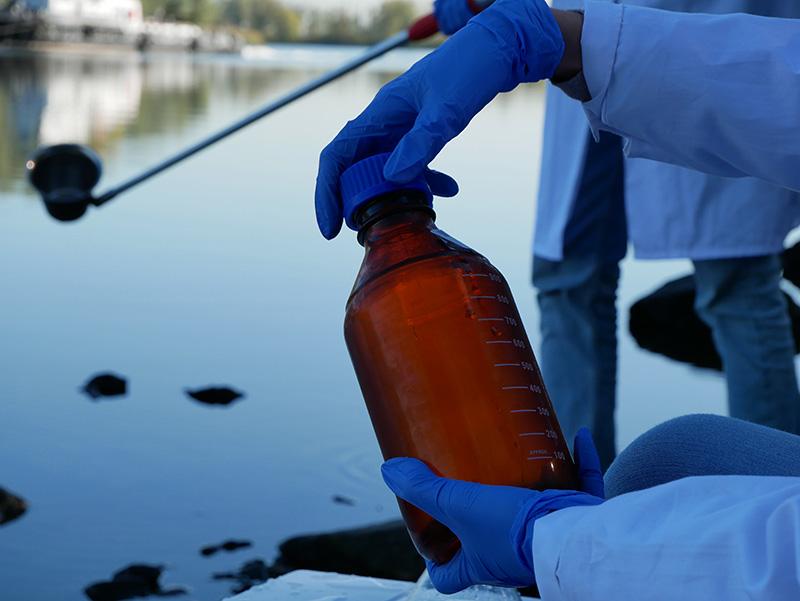
Armenia, Azerbaijan, Georgia, Moldova and Ukraine benefit from the EU support to better protect their water resources, getting closer to the EU Green Deal strategy, and in particular its “zero pollution” ambition.
The natural water cycle is the most important ecosystem service on the planet. Water is taken from the environment for all kinds of human uses (drinking water, agriculture, industry, hydro energy) and returns to the environment, often with varying amounts of pollutants.
Challenges such as climate change coupled with the effects of human activity mean that managing water resources is becoming a more challenging task. To face the challenges, the Eastern Partner (EaP) countries decided to follow international standards and EU approaches such as the Water Framework Directive (WFD). They provide a major reference to guide the EaP countries‘ efforts in balancing the impact of human activities on water with the needs of the environment.
In the framework of the European Water Initiative Plus (EUWI+), basics for sustainable water management have been improved significantly over the past years. The new programme “EU4Environment – Water and Data”, which started in February this year, builds on these achievements for water and extends the thematic focus to include greater availability of policy-relevant data for decision-makers and citizens.
New parameters monitored to increase knowledge about water quality
Achievements: In the past five years, with the support of the European Union, six laboratories in the Eastern Partner countries have been renovated or refurbished and supplied with new equipment to improve water quality monitoring. In addition, around 400 new analytical instruments and accessories have been acquired for fieldwork and water analysis in Armenia, Azerbaijan, Georgia, Moldova, and Ukraine. Local experts received training in sampling techniques and chemical analysis, but also in new holistic approaches to monitor rivers such as biological analysis, ecological or even hydro-morphological monitoring.
Improvements of integrated data management and national water information systems allow now to provide transparent data on the status and use of water resources. In total, 6 national platforms with online servers were put in service, 3 national online thematic databases were developed in Armenia, Republic of Moldova and Ukraine and 13 interactive maps gives access to 270 online web services.
Next steps: within “EU4Environment – Water and Data” Programme, countries will benefit from further capacity building to monitor their water resources. They will also be introduced to COVID-19 monitoring in wastewater. The work to improve integrated data management is continuing, this time not only for water but also for air, land use and waste. Open data and its accessibility for larger groups of stakeholders is another task to work on.
The river basin management plans identified a series of measures to better protect the health of the population and of the environment
Achievements: in five countries, river basin management plans have been developed. River basin management plans facilitate the identification of significant pressures on water resources and the identification of concrete measures to be implemented locally in the river basin. In total, around 10 plans were refined or developed, of which 2 have already been adopted (1 in Armenia, 1 in the Republic of Moldova). To develop these plans, local experts were recruited and trained, and consultation held at local level with municipalities and representative of water users (domestic, agriculture, industry, hydro energy). The plans identify targeted measures to improve water quality and efficient water use, estimate the costs of the measures, and provide indicators to monitor their implementation in the mid-term (6 years). Around 30 million citizens (40% of the countries’ population) on over 500 000 km2 (50% of the countries’ land surface) benefit from new or revised River Basin Management Plans. The majority of the measures concern sanitation and the need to build new wastewater treatment plants.
Next steps: Within the new programme, partners will introduce climate proofing measures and nature based solutions in the set of proposed measures. Among others Water Allocation Plans, a specific planning tool to outline how much water can be taken from groundwater and surface water resources, while safeguarding the sustainability of the resource and the aquatic environment, will be developed in pilot areas for some countries.
About EU4Environment – Water Resources and Environmental Data
The Programme’s activities are clustered around two specific objectives: 1) support a more sustainable use of water resources and 2) improve the use of sound environmental data and their availability for policy-makers and citizens. It is implemented by five Partner organisations: Environment Agency Austria (UBA), Austrian Development Agency (ADA), International Office for Water (OiEau) (France), Organisation for Economic Co-operation and Development (OECD), United Nations Economic Commission for Europe (UNECE). The action is co-funded by the European Union, the Austrian Development Cooperation and the French Artois-Picardie Water Agency based on a budget of EUR 12,75 million (EUR 12 million EU contribution). The implementation period is 2021-2024.





